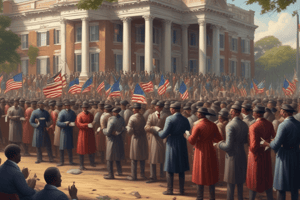Podcast
Questions and Answers
What reason does the author give for voting in elections?
What reason does the author give for voting in elections?
To have a say in who represents them in government and to influence laws and policies.
Who stated, 'The right to vote is the basic right, without which all others are meaningless'?
Who stated, 'The right to vote is the basic right, without which all others are meaningless'?
- President Ronald Reagan
- President Franklin D. Roosevelt
- President Barack Obama
- President Lyndon B. Johnson (correct)
Voting rights in the United States were established in the original Constitution.
Voting rights in the United States were established in the original Constitution.
False (B)
Who fought for the right to vote for women and African Americans?
Who fought for the right to vote for women and African Americans?
At what age do most United States citizens gain the right to vote?
At what age do most United States citizens gain the right to vote?
Every four years, the presidential election decides who will be the president and ________ for the next four years.
Every four years, the presidential election decides who will be the president and ________ for the next four years.
What can a vote for a local official determine?
What can a vote for a local official determine?
Flashcards are hidden until you start studying
Study Notes
Importance of Voting
- Voting is considered the most fundamental right that empowers individuals to shape their own futures.
- Former President Lyndon B. Johnson emphasized that without the right to vote, all other rights are rendered meaningless.
Reasons Citizens Vote
- Citizens in the U.S. vote to express their values and support policies aligned with their interests.
- Voting allows individuals to choose elected officials who represent their views at local, state, and federal levels.
- Engagement in elections is crucial, as every vote can influence government decisions and public policies.
Historical Context of Voting Rights
- Voting rights have evolved significantly; the original Constitution did not guarantee specific voting rights.
- Amendments and voting rights laws were enacted to secure suffrage for women and African Americans.
- The fight for voting rights underscores its importance in a democratic society.
Age and Eligibility
- Most U.S. citizens aged 18 and older are eligible to vote in elections.
- Voter registration is a requirement to participate in elections.
Impact of Presidential Elections
- Presidential elections occur every four years, determining the president and vice president's leadership.
- The elected president has the authority to influence government policies, propose laws, and veto legislation.
Local Elections and Community Involvement
- Local elections play a significant role in determining leaders who manage essential services like police, fire departments, and public transportation.
- Citizens have the power to affect local policies through their voting choices, which can impact community services, such as school programs and public transport availability.
- Even non-voters can contribute by encouraging eligible citizens to vote, fostering community involvement.
Key Terms
- Candidate: A person running for public office in an election.
- Election: A formal process of selecting someone for public office.
- Elected: A term describing someone chosen for office through votes.
- Local Election: Elections where mayors and local officials are chosen.
- Veto: The act of rejecting laws passed by Congress.
Encouragement for Future Voters
- Future voters are reminded of the significance of their participation in elections and are encouraged to engage others in the voting process.
Studying That Suits You
Use AI to generate personalized quizzes and flashcards to suit your learning preferences.




